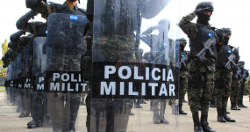Honduras President Juan Orlando Hernandez is calling for a popular referendum on whether to enshrine the nation’s military police force in the constitution, effectively sidestepping Congress’ rejection of the same measure.
On January 24, an initiative to include the Military Police of Public Order (PMOP) in Honduras’ constitution garnered 61 votes in Congress, short of the 86 votes needed for ratification, reported La Prensa. Critics in Congress voted against what they called the “further militarization of society,” and proposed technical and financial support to bolster police instead.
Minutes after the measure’s rejection, Hernandez presented the legislature with an executive decree to hold a popular referendum on the issue. Hernandez’s ministers have already approved the referendum, which is set to be voted on during the next election cycle in November 2017, reported La Prensa.
Without providing specific numbers, Hernandez touted the PMOP’s achievements in reducing violence and cited widespread support amongst Hondurans for the force’s constitutional enshrinement. However, on top of its critics in Congress, local human rights groups have called the PMOP’s creation a worrying sign of Honduras’ increasing militarization.
InSight Crime Analysis
Hernandez’s enthusiasm for the PMOP is unsurprising. Hernandez came to power promising a “mano duro” (iron fist) security policy, continuing the country’s trajectory of increasingly militarizing domestic security. What is surprising, however, is the unconventional political maneuvers and risks he is willing to take in supporting the PMOP. Enshrining a military police force in the national constitution is an odd move and begs the question: what sort of backlash or resistance is Hernandez attempting to shield the PMOP from? Additionally, attempting to skirt the legislature’s decision may hurt the president’s legitimacy, which is already suffering in the wake of Hernandez’s contested presidential election.
SEE ALSO: Honduras News and Profiles
Officially sanctioned in August 2013, the PMOP is composed of military personnel who have undergone special police training. The force was originally budgeted $1.2 million and tasked with responsibilities including taking back city areas from street gangs, combating organized crime, and making arrests. With an additional 1,000 troops added in November, the PMOP’s ranks include roughly 3,000 members.

